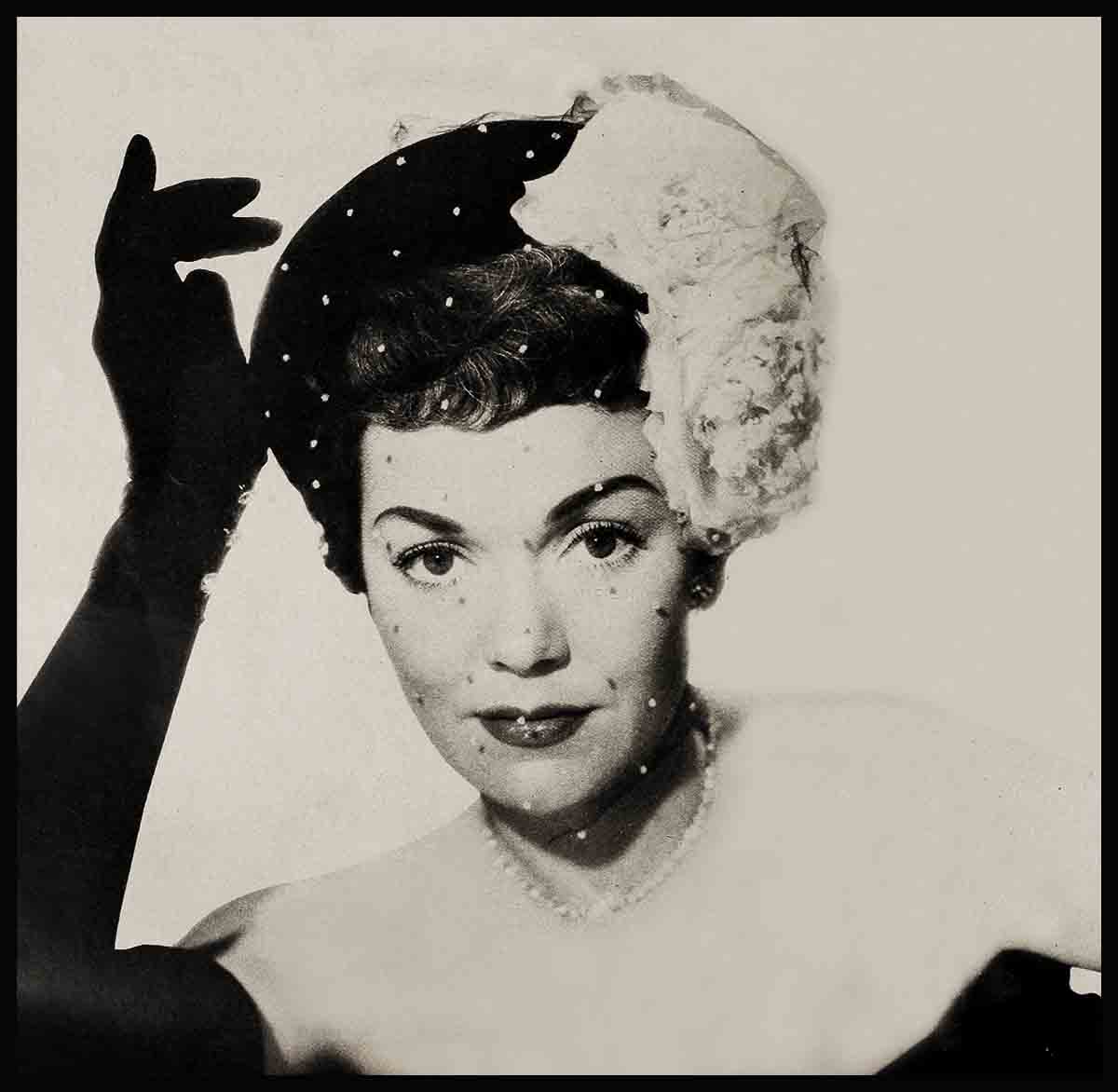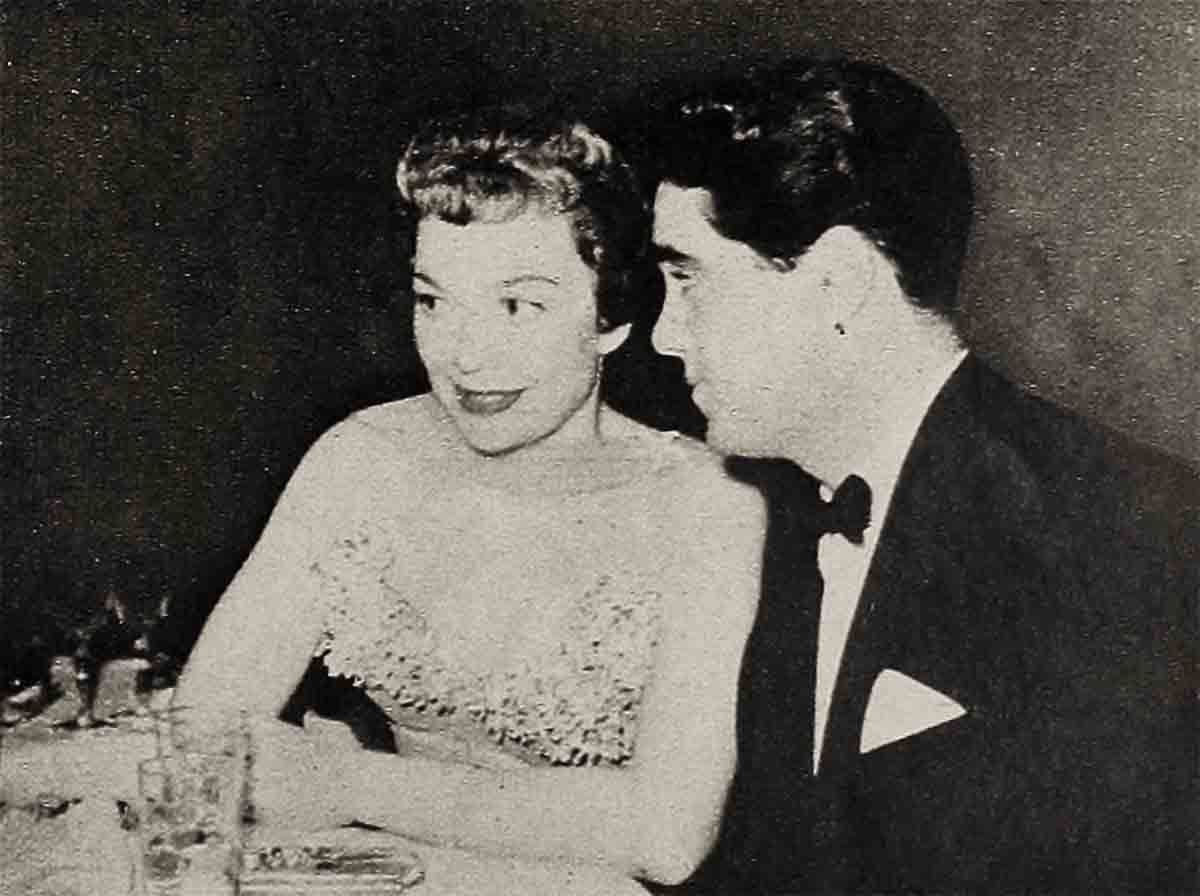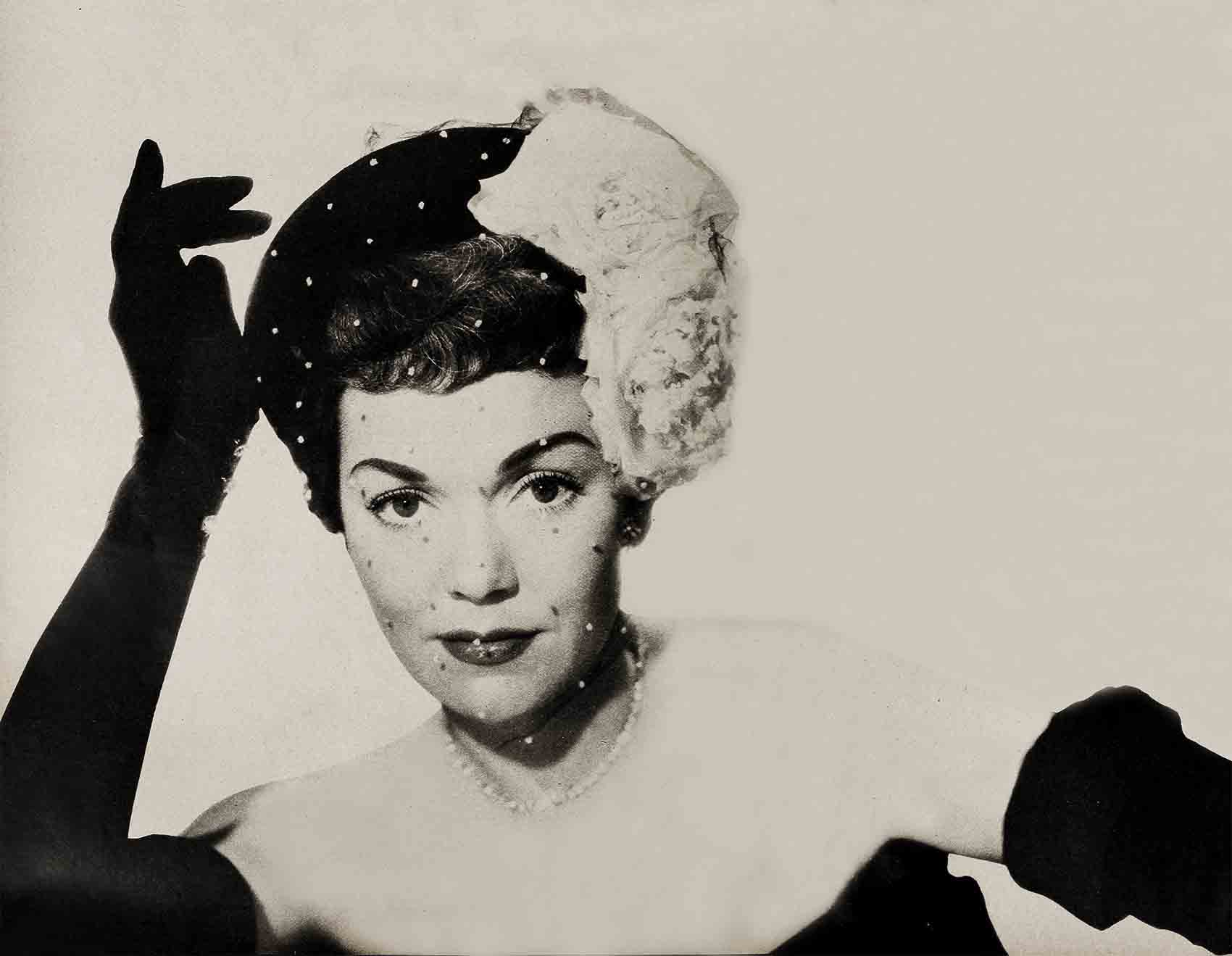
Darling, You’re Nuts?—Jane Wyman
This is a very special kind of love story, a Hollywood love story. It concerns a very beautiful, very intelligent and very real girl named Jane Wyman and a very handsome, equally intelligent and fine guy named Travis Kleefeld.
This story has Hollywood completely bewildered. And this is the first time that the facts of it have been told.
Janie and Trav met during Christmas week—but Hollywood never knew how serious it was with them until mid-March; when Louella Parsons gave to the world the exclusive announcement that they were engaged to be married.
Hollywood was overjoyed. This wacky town is basically romantic, even though it begrudges certain people happiness. For instance, nobody knocked anybody out to see that Marlon Brando woh this year’s Oscar. But from the moment that Sarah Jane Fulks, self-titled Jane Durrell, came bouncing into the film colony in the late thirties, everybody has wanted her to get everything her generous heart desired. She’s been such a fine loyal friend to so many people. She’s become a superb actress and is such a wonderful mother to her kids. And ever since she and Ronnie Reagan parted, five years ago, Hollywood has worried about her.
Thus it was great news that she was thinking of marrying again. But a little more than three weeks after her announcement came a shocker. Jane Wyman, again via Louella, told the world she had canceled her engagement to Travis. But they were, she said, still the best of friends.
For once, that most polite of Hollywood’s fictions, is completely true. Janie and Trav are such understanding friends that they see one another constantly, are each other’s favorite companion—or as Jane says, “We became engaged to take the special Hollywood pressures off us, and then we broke our engagement for the very same reason.” Actually they are waiting to act wisely rather than impulsively, waiting to know one another, as well as be fascinated by one another, waiting for several very special factors in both their lives to be worked out.
Many a girl has done what Janie almost did this March: seen a guy, fallen pretty hard, told herself she was completely in love. And any fellow, like Trav, would naturally tumble for a human dynamo like Jane, who also possesses beauty, fame and terrific charm. But to have the sheer social courage to call “whoa” on yourself, as Jane did, in order to be sure that this was the love that leads to marriage takes character. It also takes trust and love to do as Trav did and to say, “Darling, you’re nuts, but if that’s the way you want it, that’s the way it is.”
Actually—and amusingly—they didn’t fall in love with one another at first sight. (They didn’t even like each other very much.) They met at a dinner party in the home of mutual friends, where they sat next to each other at a table.
“I seem to have been in a dignified mood,” Janie says, now, grinning. “Don’t ask me why; I don’t know. Maybe I was having a hangover from the Blue Veil or something. Anyhow, after dinner when Trav asked me if I’d dance I gave him the ‘no thank you,’ bit.
“However, as the evening wore on, and I noticed how everybody in the room was responding to his good nature, I warmed up a little, and just before the party broke up, when we were all out in the kitchen eating chili and beans, I began to think this was someone I might be interested in knowing. He must have got my message, because just at that moment, Trav looked over at me and said, May I call you up next week?

“That threw me again. I thought, what’s wrong with me that he wants to wait till next week to call? But I said, airily, ‘Oh, sure. Do give me a ring.’ That was Saturday night and he called me Monday morning. We nxed up a date for the following Saturday.”
There’s a tiny place tucked away in Los Angeles called the Tiffany Club. Only real hot music lovers know about it. But Janie’s that, and so, it turned out, was Trav. He couldn’t have made more of a hit with her than suggesting that they go, not to a plush nightspot, but to the Tiffany to hear Nat King Cole.
Thus, on their’ first real date together, they were bowling along downtown, and, to be in the mood, Janie was singing King Cole’s “Lush Life” along with the record being played on Trav’s car radio, when smash! Tray jammed the car in front of them which had stopped too suddenly.
In an instant, Trav was out and apologizing to the driver, a little old lady. They looked over her car and saw that he hadn’t actually hurt it at all. He gave her his card, the name of his insurance company. The lady, responding to his charm and good manners, gave him a smile, and drove on. It wasn’t until then that Trav noticed his own car—his new car, his luxury car. That had its whole nose jammed in! It was third-cousin to a wreck and it turned out to be a very special art to even limp it to the Tiffany Club. Finally, the automobile club came to haul it away.
Janie and Trav laughed like crazy, heard Nat King Cole till dawn, took a taxi back to Jane’s—and Trav said he’d call next morning. He did. They had two dates the following week. They had three the week after. The week after that they had four and by the end of January and up until they broke their engagement, they dated every night.
But in between there were those pressures—those special Hollywood pressures for love and the very special Hollywood pressures against it.
“I’m impulsive,” Jane confessed, sitting in the library of her exquisite home. Outside, making an enormous racket, were Maureen, who is now 10, and Michael, who is seven. They were impatiently waiting for their mother, who was driving them out of town for a special week-end, just the three of them, away, alone together. “I’m madly impulsive,” Jane repeated. “I do things and then I think, What did I do? And when I have that doubt, then I know I must pause and get it straightened out.”
You can search the Hollywood record backward and forward and you’ll never find a star who has kept things straightened out better than Jane. Take the matter of agents. Most stars change their agents about as often as they change their hair styles. Not Janie. When she first came to town, an unknown little radio singer, she signed with an unknown agent named Lou Wasserman. He’s still her agent, still one of her best friends, but now he’s climbed as high as she to head the mighty MCA.
For another example. It’s an old Hollywood wisecrack that all stars fight with Warner Brothers, that is, if they are under contract to them. Warner Bros. Brothers. On both sides it’s a mutual admiration society. On both sides they are happy as larks.

One more example. Most stars turn over their domestic help as often as they turn over their bank balances. Janie has had the same wonderful housekeeper, Carrie, since before Maureen was born, and the way they glow at one another makes you feel as though you were in a room full of white satin stoves. Now Janie, on her charm bracelet, wears a fifty cent piece, which has been dipped in gold. She gives that pixie grin of hers when she explains its significance to her. “When I first started out in this business,” she says, “a friend gave this to me and had it engraved, ‘It’s the principle of the thing.’ And it is. Everything is. You’ve got to get the principles right and stick with them, particularly in this town, or you are utterly lost. This gold-dipped 50-cent piece looks like gold, but it isn’t really. On the other hand, it’s not quite—or rather it’s more, than a half dollar.”
It is because Jane sincerely believes, and rightly, that love in Hollywood is like that 50-cent piece—at once itself and more than itself—that she felt she had to pause on the threshold of marriage. In justice to herself and Tray she wants to be sure of their love.
“Whether or not we like it,” Jane said to me, “any of us who become so-called ‘names’ do become public institutions. I’m not saying we aren’t royally rewarded for it. I’m not claiming it isn’t all very exciting and wonderful. I love it. But the fact still is that our lives get cut up more than a boarding house pie. In the broadest sense my life is divided into three sections—Jane Wyman, the movie star, who makes two pictures a year or maybe more, then the mother of Maureen and Michael Reagan, who tries to be a good mother, then Jane Wyman, herself. However, on top of that, there’s the ‘institution.’ The ‘Institution’ calls me here to help launch the Red Cross drive or Community Chest or something like that every week or so. I’m asked to broadcast for the Hallmark Card Company, or a dozen other firms and I’m delighted to do so, because they have been so good to me in the past. Then, ever since ‘Cool, Cool, Cool of the Evening,’ the ‘institution’ has been in the record business.
“Don’t tell me that I don’t have to do all these things. are very hard to resist. They are part of an enormously exciting business. Besides, all of us out here always think these extra activities will not take as much time as they do. In fact, they always take twice as much time as we expect, but still we don’t believe it.
The “institution” then was what exerted the special pressures on Jane, when she and Trav began dating seriously and nightly. One of those very special pressures can be traced to Hollywood’s dramatic instinct to build up everything twice as high as it really is; a second pressure is publicity. All Janie’s friends, and she has legions of them, began asking, “Darling, are you really in love again? you being married?” And when Ronnie married Nancy Davis the questions came thick and fast. “When are you setting the date?” Janie was asked from dawn to dusk.
Then publicity came along and said, “Hey, this is getting rough. What shall we tell the press?”
Naturally, Trav had his side in all of this, too. He’s a handsome fellow—tall, dark and laughing. For a brief time, he wanted to be an actor. However, he changed his mind and went into the construction business, and to his great credit has made a wonderful success in the business world.
“That’s one of the things I find so stimulating about Trav,” Jane said, “that executive ability. But when I stopped to think about what marriage would mean to us, I began wondering where we would live. Not here. I would certainly never subject a new marriage to the pressure of living against an old background. You know how that can ruin things.”
Janie’s face lighted up, suddenly. “One of the best things I can say for Trav,” she explained, “is the way my Michael likes him. Michael’s all man, and very much my protector. In the past I’ve had a couple of escorts he didn’t like. He behaved beautifully at all times, was very much the little gentleman, but simply too dignified. I knew Trav was ‘in’ the day Michael brought down one of his toys to him and asked, ‘Do you know how to make one of, these things work?’ Trav was able to repair it instantly.”
I think Jane would give up anything or anybody who’d seem to shadow Maureen’s or Michael’s happiness. The two of them attend a very fashionable school, about 40 miles out of Hollywood, and are home every week-end. Lots of other movie children go there—Joan Crawford’s Christina and Christopher, for example—and Jane alternates with other mothers in going down to pick up their various broods. But Jane gives up every Friday to Monday, whether or not she is acting as school chauffeur, to her son and daughter.
Add up all of these factors and you see, as Jane does, “the special pressures.”
Add them all together, and you can see how it was possible for her to go to dinner and dance all evening, and then, homeward bound, tell Trav that she felt it wiser to break their engagement.
And really it is wise as everyone knows to want your mind to be as completely in love as your heart seems to be. And really it is wise, particularly in Hollywood, to wait.
Except that even though Trav said, “You’re nuts, darling,” they still’ see one another every night and call one another every day. And she’s thinking about his future and he’s thinking about hers.
And do you think any two people, who aren’t wildly in love, act that way?
THE END
—BY RUTH WATERBURY
(Jane Wyman can soon be seen in Warner’s The Story of Will Rogers.—Ed.)
It is a quote. MODERN SCREEN MAGAZINE JULY 1952




